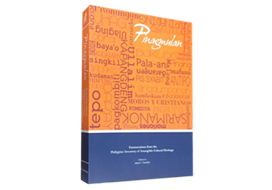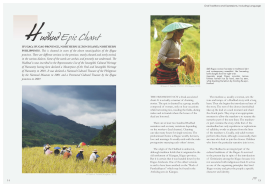
A ~ L
-
- Discourses on ICH Safeguarding Issues
- - Information&Networking for the Safeguarding of Intangible Cultural Heritage
- - Safeguarding of Intangible Cultural Heritage& Intellectual Property Rights Trends and Challenges
- - Building and Sharing ICH Information
- - Regional Collaboration for Safeguarding ICH in Asia and the Pacific;Tasks and Strategies
- - Creative Value of ICH for Sustainable Development
- - Reflection on the Efforts to Safeguard ICH and Prospects for the Future
- - Towards Efficient Roles of NGOs for Safeguarding ICH in the Asia-Pacific Region
- - Oral Tranditions And epics of Central Asia
- - Traditional Medicine Sharing Experiences from the Field
-
- Intangible Cultural Heritage in Uzbekistan
- - ELEMENTS INSCRIBED IN THE REPRESENTATIVE LIST OF INTANGIBLE CULTURAL HERITAGE OF HUMANITY
- - UZBEK ORAL TRADITIONS AND EXPRESSIONS
- - PERFORMING ART
- - SOCIAL PRACTICES, RITUALS AND FESTIVE EVENTS
- - KNOWLEDGE AND PRACTICES CONCERNING NATURE AND THE UNIVERSE
- - KNOWLEDGE AND PRACTICES CONCERNING TRADITIONAL CRAFTSMANSHIP
M ~ P
-
- Mongoila-ICHCAP Cooperatitve Projects
- - Introducing the UNESCO Living Human Treasures System in Mongolia
- - Establishing a Safeguarding System for Intangible Cultural Heritage in Mongolia
- - Publishing the Guidebook on the Intangible Cultural Heritage of Mongolia
- - Safeguarding Intangible Cultural Heritage by Utilising Information Technology
- - ICH Documentation Workshop and Pilot Filming in Mongolia
-
- Music, Songs and Stories:Archival Selections from India
- - HISTORICAL RECORDINGS FROM THE 1930S OF ARNOLD BAKE VOL 1: LULLABIES
- - HISTORICAL RECORDINGS FROM THE 1930S OF ARNOLD BAKE VOL. II: EVERYDAY SONGS
- - SUFI TRADITIONS OF NORTH INDIA
- - NARRATIVE TRADITIONS – ORAL EPICS AND BALLADS VOL. I: THE TULU PADDANA
- - NARRATIVE TRADITIONS – ORAL EPICS AND BALLADS VOL. II: THE JAGAR AND THE EPIC OF ALHA
- - WOMEN’S VOICES FROM THE MOUNTAINS
- - MUSIC OF BASTAR AND CHHATISGARH
- - PERCUSSION AND PERFORMANCE – DRUMMING TRADITIONS
- - KARTATAK CLASSICAL INSTRUMENTAL MUSIC – NAGASWARAM PERFORMANCE BY KOTTUR RAJRATHNAM PILLAI
-
- Pinagmulan: Enumeration from the Philippine Inventory of Intangible Cultural Heritage
R ~ Y
-
- - Folk Music of Ethnic Minorities in Northern Mountain Regions of vietnam
- - FOLK MUSIC OF SOME ETHNIC MINORITIES IN THE CENTRAL HIGHLANDS, VIETNAM
- - HAT XOAN IN PHU TH?, VIETNAM
- - QUAN H? B?C NINH IN THE NORTH VIETNAM
- - HAT V?N
- - CA TRU SINGING
- - CA HU? (THE HU? SINGING) IN CENTRAL VIETNAM
- - đ?N CA TAI T?,A CHAMBER MUSIC OF SOUTHERN VIETNAM
- - Music of Traditional Theatre in vietnam
-
- - Yapese Traditional Dance Chants
- - Stories of Yapese Traditions and Customs I
- - Stories of Yapese Traditions and Customs II
- - Oral History on Yapese Culture and Traditions, Yapese Traditional Money
- - Ulithian Women’s Sitting Dance Chants
- - Two Stories from Ulithi
- - Chants from Satawal and Woleai Atolls
- - Chants from Satawal, Lamotrek, and Elato Islands
- - Yapese Traditional Dances I
- - Yapese Traditional Dances II








